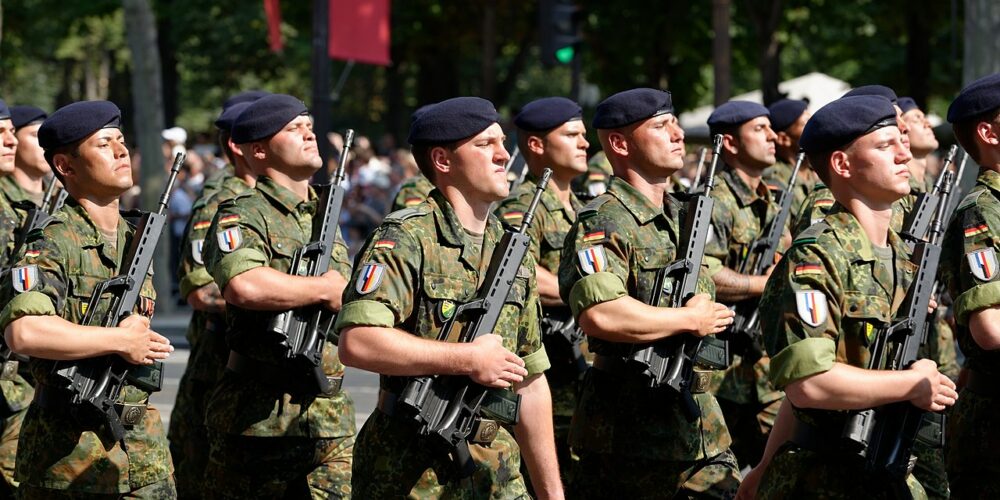■ Reprinted from People’s News, 27 June 2021
Last month, German Defence Minister Annegret Kramp-Karrenbauer and her French counterpart, Florence Parly, met to discuss the Future Combat Air System (FCAS) programme. This came amid reports that German Chancellor Angela Merkel’s conservative government is anxious to have the FCAS programme’s financing fully decided before the Bundestag (parliament) elections in September.
The FCAS, expected to be operational by 2040, is a massive programme to build fighters, drones, combat technologies involving “cloud” computing, and secure communication systems. It got the green light in a 2017 meeting of the Franco-German Council of Defence Ministries, with spending to be shared equally between Paris and Berlin. Estimates of its overall cost range from €100 billion to a recent report in the Frankfurter Allgemeine Zeitung placing it at €500 billion.
From its inception, this programme was based on massive military spending increases financed by EU austerity attacks and sweeping cuts to social spending. After the NATO-backed regime change operation in Ukraine in 2014, the NATO military alliance called on European states to spend 2 per cent of Gross Domestic Product (GDP) on defence.
Germany reported record high military spending of €53 billion this year. For its part, amid the collapse in GDP due to the pandemic, France is allocating 2.1 per cent of its GDP, or €49.7 billion, to its defence budget. France’s 2019-25 military budgeting law gave the armed forces €18 billion more in 2019 than they received in 2017. Last year, Parly reported that the French military’s investment budget between 2019 and 2023 would total €110 billion.
This spending has gone hand in hand with a growing campaign by politicians and media to develop the EU as an aggressive military alliance. In 2018, amid mass “yellow vest” protests against social inequality, French President Emmanuel Macron insisted that Europe had to be prepared for war against Russia, China and the United States. Such arguments were retailed in countless articles by German and French media.
In 2019, German public broadcaster Deutsche Welle warned that if the EU “does not act as one, it will find itself at the whim of other world powers.” It added, “our military and industrial sectors are at risk of becoming technologically dependent. That makes co-operation not just an option, but a requirement.”
Indeed, French military chief of staff General Thierry Burkhard recently told Britain’s Economist that France needs a “hardening” of its land army, currently fighting a bloody war in Mali: “We absolutely have to prepare for a more dangerous world.” The type of conflict being considered is exemplified by the French military’s Operation Orion, war games slated for 2023 to train for high-intensity warfare against other major powers. Currently, reports indicate French forces up to the strength of a division, or around 25,000 soldiers, could be involved in the exercise in northern France, along with UK, Belgian and US troops.
Le Nouvel Economiste recently devoted an article to Operation Orion, noting that it is part of a “generational transformation” of the French and European military.
The magazine reported, “The spectre of high-intensity warfare is now so widely spread in French military thought that this scenario has its own acronym: HEM, or Hypothesis of a Major Engagement. Possible adversaries are not named but include not only Russia, but also Turkey or a North African country. French generals believe they have a decade to prepare. Study groups cover all potential issues, from arms shortages to social resilience, to the question of whether citizens are ‘ready to accept a level of losses we have never seen since World War II,’ says one participant.”
These reports underscore the critical necessity of a mobilisation of those in Ireland who favour and realise the value of peace in our lives. It is time to revitalise the concept of active neutrality in the face of rapid EU militarisation and real preparations for conflict within the militaries of the major EU powers. Readers will be already aware of the chorus of demands for increased military expenditure here in Ireland. It will be too late when the first shots are fired.






